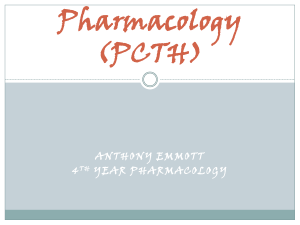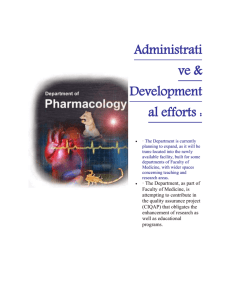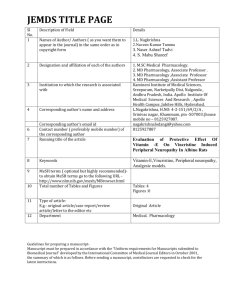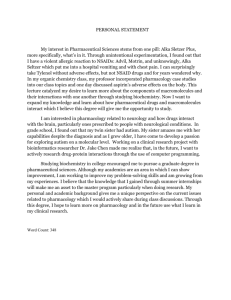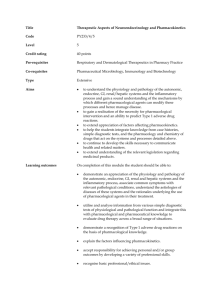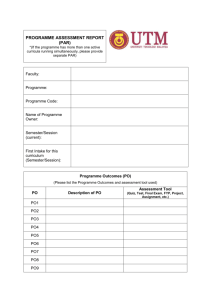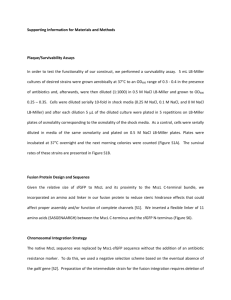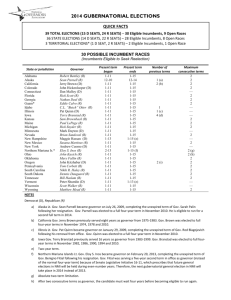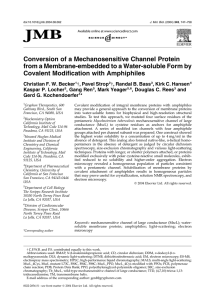University of Kent at Canterbury
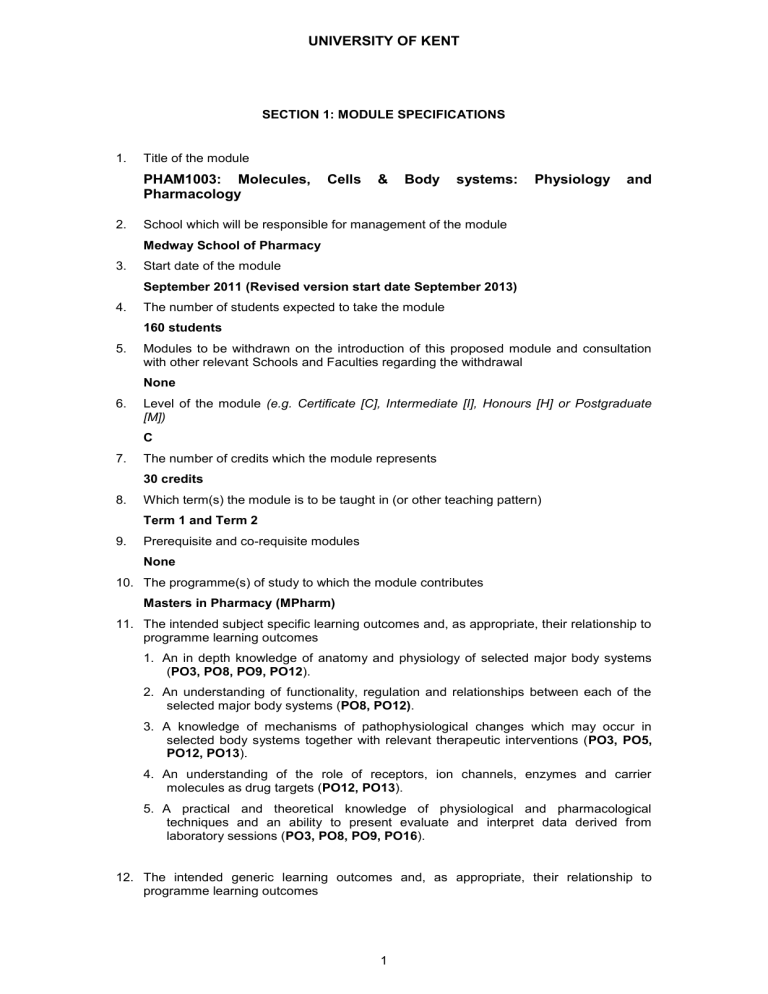
UNIVERSITY OF KENT
SECTION 1: MODULE SPECIFICATIONS
1. Title of the module
PHAM1003: Molecules, Cells & Body systems: Physiology and
Pharmacology
2. School which will be responsible for management of the module
Medway School of Pharmacy
3. Start date of the module
September 2011 (Revised version start date September 2013)
4. The number of students expected to take the module
160 students
5. Modules to be withdrawn on the introduction of this proposed module and consultation with other relevant Schools and Faculties regarding the withdrawal
None
6. Level of the module (e.g. Certificate [C], Intermediate [I], Honours [H] or Postgraduate
[M])
C
7. The number of credits which the module represents
30 credits
8. Which term(s) the module is to be taught in (or other teaching pattern)
Term 1 and Term 2
9. Prerequisite and co-requisite modules
None
10. The programme(s) of study to which the module contributes
Masters in Pharmacy (MPharm)
11. The intended subject specific learning outcomes and, as appropriate, their relationship to programme learning outcomes
1. An in depth knowledge of anatomy and physiology of selected major body systems
( PO3, PO8, PO9, PO12 ).
2. An understanding of functionality, regulation and relationships between each of the selected major body systems ( PO8, PO12) .
3. A knowledge of mechanisms of pathophysiological changes which may occur in selected body systems together with relevant therapeutic interventions ( PO3, PO5,
PO12, PO13 ).
4. An understanding of the role of receptors, ion channels, enzymes and carrier molecules as drug targets ( PO12, PO13 ).
5. A practical and theoretical knowledge of physiological and pharmacological techniques and an ability to present evaluate and interpret data derived from laboratory sessions ( PO3, PO8, PO9, PO16 ).
12. The intended generic learning outcomes and, as appropriate, their relationship to programme learning outcomes
1
UNIVERSITY OF KENT
1. An ability to work and communicate effectively with others ( PO3, PO12, PO16 )
2. An ability problem-solve relating to quantitative data, calculations and numeracy
( PO2, PO3, PO12 )
3. An ability to critically evaluate quantitative data ( PO4, PO16 )
4. An ability to accurately retrieve and understand information as part of self-directed learning ( PO13 )
5. An understanding of the accepted ethical principles involved in the collection, use and interpretation of scientific data ( PO15 )
13. A synopsis of the curriculum
This module aims to provide students with a detailed knowledge and understanding of human anatomy and physiology of the major body systems. In addition selected examples of pathophysiology will introduce the concept of disease and the role of non- pharmacological and pharmacological interventions.
The module also provides an introduction to the pharmacological basis of drug action which will provide the underpinning knowledge necessary to develop a deep understanding of the pharmacology and therapeutics covered later in the
MPharm and Foundation courses.
14. Indicative Reading List
Indicative Texts
ISBN Number
0321311981
0321545982
Author
Martini, F.
Martini, F.
Date Title
2005
2008
Fundamentals of Anatomy and Physiology 7th Ed
Fundamentals of Anatomy and Physiology 8th Ed
2006 Integrated Pharmacology,
3 rd Edition
Publisher
Prentice Hall
Prentice Hall
0323040802*
443071454*
9780443069116
Page, C.B., Curtis,
M., Walker, M., and Hoffman, B.
Rang H.P., Dale
M.M., Ritter J.M.,
Moore, P.K. &
Lamb, P.
Rang H.P., Dale
M.M., Ritter J.M., &
Flower, R.J.
2003
2007
Pharmacology 5th Edition
Pharmacology 6th Edition
Mosby
Churchill
Livingstone
Churchill
Livingstone
15. Learning and Teaching Methods, including the nature and number of contact hours and the total study hours which will be expected of students, and how these relate to achievement of the intended learning outcomes
Summary of Learning and Teaching Activities
Lecture Practical MSCL/
CAL
Seminars
45 36 99 6
Private
Study
111
Formal assessment
1 x 3 hour exam
Total hours
300
2
UNIVERSITY OF KENT
Lectures are intended to present the key points and relate directly to the learning objectives.
These will address learning outcomes 11.1-11.4.
Practicals (laboratories/workshops) serve to reinforce material presented in the lectures and relate directly to the learning objectives. These will address learning outcomes 11.1-11.5 and
12.1-12.5.
MSCL/CAL serve to reinforce material presented in the lectures and practical components.
They also form part of the self-directed learning for the student. These will address learning outcomes 11.1-11.5 and 12.1-12.5.
Seminars, which are generally timetabled at the end of Term 2, offer the students an opportunity to ask further questions of the staff and reinforce key points. These will address all learning outcomes.
Private study encompasses the revising all material presented in the lectures, laboratories, workshops, MSCL. Students should be able to work through the learning objectives (above) and identify key areas that require further revision .
16. Assessment methods and how these relate to testing achievement of the intended learning outcomes
Assessment details
Methods of
Assessment
Continuous assessment
Learning outcomes assessed
5.
Weighting
SSLO11.1-11.5
GLO12.1-12.5
40%
SSLO11.1-11.5
GLO12.1-12.5
PASS required
SSLO11.1-11.4
Outline Details
Written report for a selected laboratory (40%)
Satisfactory attendance and performance at all laboratories (80% minimum attendance is
COMPULSORY)
Interim assessments (60%)
Examination SSLO11.1-11.5 60% 3 hour Examination
Pass mark
The pass mark for this module is 40% overall and final written examination. Satisfactory attendance and performance at all scheduled coursework sessions is normally defined as a minimum of 80% attendance of all laboratory classes, plus lab books maintained to the required
GLP standard (graded PASS or REFER).
The laboratory report tests the students’ fundamental understanding of key concepts in physiology and pharmacology as well as numeracy, calculations, and a critical interpretation of scientific data.
There are two interim assessments. The first interim assessment is given at the end of the first term and tests knowledge of all material presented in term 1. The second interim assessment tests knowledge of all material presented in term2.
The three hour written examination assesses all learning outcomes.
17. Implications for learning resources, including staff, library, IT and space
Current resources are adequate. This module has been running at the Medway School of Pharmacy for four years. However, just the name is being changed.
3
UNIVERSITY OF KENT
18. The School recognises and has embedded the expectations of current disability equality legislation, and supports students with a declared disability or special educational need in its teaching. Within this module we will make reasonable adjustments wherever necessary, including additional or substitute materials, teaching modes or assessment methods for students who have declared and discussed their learning support needs.
Arrangements for students with declared disabilities will be made on an individual basis, in consultation with the University’s disability/dyslexia support service, and specialist support will be provided where needed.
19. Campus(es) where module will be delivered:
Medway
If the module is part of a programme in a Partner College or Validated Institution, please complete the following:
20. Partner College/Validated Institution:
21. University School (for cognate programmes) or Faculty (for non-cognate programmes) responsible for the programme:
SECTION 2: MODULE IS PART OF A PROGRAMME OF STUDY IN A UNIVERSITY
SCHOOL
Statement by the School Director of Learning and Teaching/School Director of
Graduate Studies (as appropriate): "I confirm I have been consulted on the above module proposal and have given advice on the correct procedures and required content of module proposals"
BOApampa
Director of Learning and Teaching
Dr Buge Apampa
………………..
Date
Print Name
Statement by the Head of School: "I confirm that the School has approved the introduction of the module and, where the module is proposed by School staff, will be responsible for its resourcing"
................................................................. ………………….
Head of School
Prof I Cumming
Print Name
Date
4

